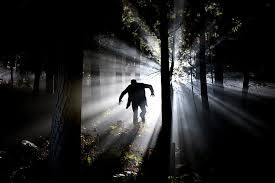The Fear That Follows Him
How Fear Replaced Leadership in American Politics
By Dino Alonso
There is a question we are not asking loud enough in this country, though it sits plainly in front of us:
Why are so many people afraid of Donald Trump, yet still follow him?
They fear him in silence. They vote for him anyway. They defend him on television with trembling voices and hollow eyes. And they support him, even as he threatens to destroy the very ground they’re standing on.
This is not politics. This is submission.
And I do not mean the kind born of conviction. I mean the kind born of fear—raw, bone-deep, and utterly corrosive. It is the fear of retaliation, banishment, and being turned into the next object of his fury. And that fear now governs many people who were once elected to lead.
You can see it in their language—hedged, vague, hesitant. You can see it in their eyes, darting toward his shadow. You can see it in their silence when the truth would cost too much. They are not loyal. They are terrified.
Because Donald Trump does not lead, he threatens. He does not debate. He humiliates. He does not represent. He rules by spectacle, punishes disobedience, and rewards only the echo.
So we must ask again: why do so many cheer him on? Why do millions raise their voices in allegiance to a man who would not hesitate to crush them the moment they step out of line?
The answer, I fear, is more profound than politics.
Trump offers something more powerful than policy: he provides permission. Permission to hate, permission to blame, permission to turn away from the difficult work of self-examination and instead point the finger at anyone else.
He has not captivated people with solutions. He has captured them with grievance, with the idea that their losses, struggles, and disappointments are not the result of fate or policy or the complexity of the world but because someone else stole something from them.
And so he becomes the avenger, the strongman, the father figure for the wounded citizen. He speaks in absolutes so they don’t have to think. He offers certainty so they don’t have to feel doubt. And he promises punishment, not justice—because punishment is easier to cheer for.
But what they do not see—or refuse to see—is that this kind of power is a devouring thing. It does not protect its followers. It consumes them.
Because the man they fear today is not satisfied with obedience. He requires adoration. He demands sacrifice. And when the cheering stops, or the applause falters, or the slightest question is raised, he turns.
He turns on his friends.
He turns on his allies.
And in the end, he will turn on the people who made him powerful.
That is the nature of a man who loves power more than people.
And so I ask: what are you afraid of?
Are you afraid of losing your standing, your job, your safety, or your identity? I understand that fear. But ask yourself—what do you think will remain when he is done?
You will not be safer.
You will not be richer.
You will not be freer.
Because authoritarians do not build, they burn. They take. They mock the very people who serve them. They make fools of those who cheer too loudly. And they do not stop until the silence is total.
So I will ask you what this country will one day ask you:
Did you follow him because you believed in something?
Or because you were too afraid to say no?
That is the question that will follow all of us.
History does not remember silence kindly.
And power, once handed over to fear, never returns willingly.
So speak now.
Even if your voice shakes.
Even if you’re the only one.
Because the man you fear is not half as dangerous as what you lose when you stop speaking.



I'd like to understand it as well.
We should just call it what it is. Fascism.